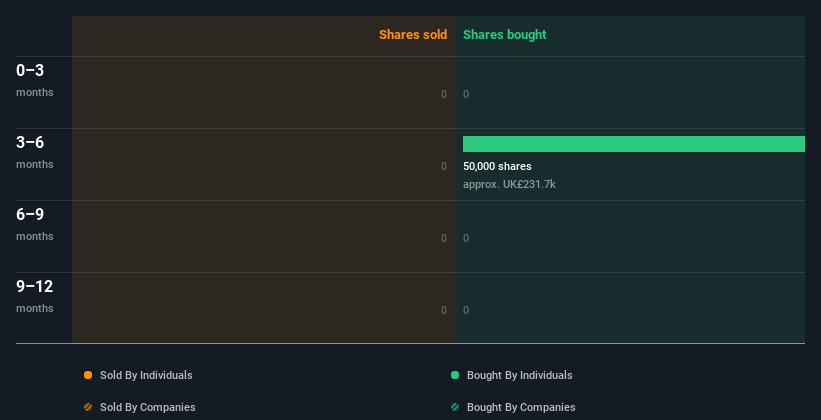This PayPoint Insider Increased Their Holding By 46% Last Year
Insiders were net buyers of PayPoint plc's (LON:PAY ) stock during the past year. That is, insiders bought more stock than they sold.
Although we don't think shareholders should simply follow insider transactions, logic dictates you should pay some attention to whether insiders are buying or selling shares.
Check out our latest analysis for PayPoint
PayPoint Insider Transactions Over The Last Year
Over the last year, we can see that the biggest insider purchase was by CEO, Member of Executive Board & Executive Director Nicholas Wiles for UK£232k worth of shares, at about UK£4.64 per share. That implies that an insider found the current price of UK£4.88 per share to be enticing. Of course they may have changed their mind. But this suggests they are optimistic. If someone buys shares at well below current prices, it's a good sign on balance, but keep in mind they may no longer see value. Happily, the PayPoint insider decided to buy shares at close to current prices. Nicholas Wiles was the only individual insider to buy during the last year.
You can see the insider transactions (by companies and individuals) over the last year depicted in the chart below. If you click on the chart, you can see all the individual transactions, including the share price, individual, and the date!
There are always plenty of stocks that insiders are buying. So if that suits your style you could check each stock one by one or you could take a look at this free list of companies. (Hint: insiders have been buying them).
Insider Ownership Of PayPoint
Looking at the total insider shareholdings in a company can help to inform your view of whether they are well aligned with common shareholders. Usually, the higher the insider ownership, the more likely it is that insiders will be incentivised to build the company for the long term. Our data indicates that PayPoint insiders own about UK£7.6m worth of shares (which is 2.2% of the company). But they may have an indirect interest through a corporate structure that we haven't picked up on. Overall, this level of ownership isn't that impressive, but it's certainly better than nothing!
What Might The Insider Transactions At PayPoint Tell Us?
The fact that there have been no PayPoint insider transactions recently certainly doesn't bother us. However, our analysis of transactions over the last year is heartening. We'd like to see bigger individual holdings. However, we don't see anything to make us think PayPoint insiders are doubting the company. In addition to knowing about insider transactions going on, it's beneficial to identify the risks facing PayPoint. To help with this, we've discovered 4 warning signs (1 shouldn't be ignored!) that you ought to be aware of before buying any shares in PayPoint.
Of course, you might find a fantastic investment by looking elsewhere. So take a peek at this free list of interesting companies.
For the purposes of this article, insiders are those individuals who report their transactions to the relevant regulatory body. We currently account for open market transactions and private dispositions of direct interests only, but not derivative transactions or indirect interests.
Have feedback on this article? Concerned about the content? Get in touch with us directly. Alternatively, email editorial-team (at) simplywallst.com.
This article by Simply Wall St is general in nature. We provide commentary based on historical data and analyst forecasts only using an unbiased methodology and our articles are not intended to be financial advice. It does not constitute a recommendation to buy or sell any stock, and does not take account of your objectives, or your financial situation. We aim to bring you long-term focused analysis driven by fundamental data. Note that our analysis may not factor in the latest price-sensitive company announcements or qualitative material. Simply Wall St has no position in any stocks mentioned.

 Yahoo Finance
Yahoo Finance 
